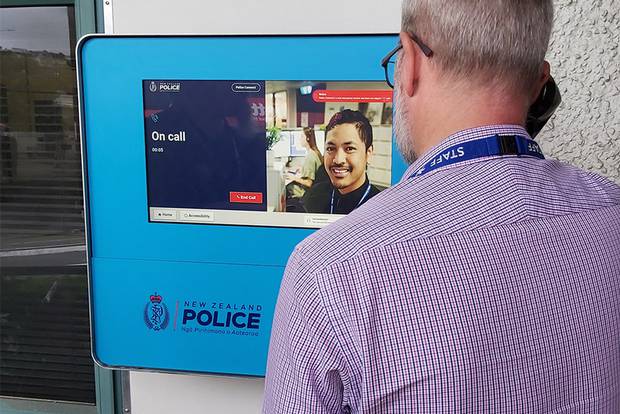
Ella, the Māori artificial intelligence cop at the centre of the police's new digital services, was revealed at the police national headquarters in Wellington this morning.
Ella, which stands for Electronic Lifelike Assistant, is part of two new digital kiosks police have designed to help reduce queues in stations and to provide a modern way to connect with the public.
Designed as a mix of 26 different people, Ella is the brain child of project manager Erin Greally, and will primarily be available only at the headquarters building in Molesworth Street, where users can ask for information or be connected to whoever they're visiting.
If the three-month pilot goes well, police hope to have Ella's friendly, CGI face spread across kiosks throughout the country.
The other kiosk in the pilot is the police connect service, which people can use to ask for information on commonly asked questions, report a crime, or be connected to someone at the call centre.

"We believe we could put these anywhere."
The kiosks will have CCTV monitoring and other alarms built into them.
The new services were "a continuation of the modernisation of the New Zealand police force", he said.
"This is to complement our presence in the community."
Bush said it was "a modern world out there" and there were a lot of people who wanted to connect to police in a different way.
The kiosks meant less time spent waiting at front counters, and were helpful for people who did not feel comfortable speaking directly to somebody.
"Only about 25 per cent of crimes are reported . . . we need to increase that, and this is what these channels do."
The development of the trial, including the four units, cost police $373,000.
A single unit costs between $12,000 and $15,000.
Police's digital person proof of concept is part the AI programme with a budget of $685,000. This includes technology and external services to develop the AI engine and the digital person avatar.
Police had developed Ella to add a "personal touch". While she may not have all the answers people seek yet, as AI she will continue to learn and grow as her services are used.
Bush said AI had been "proven to work" in other organisations, and said it was a "wonderful addition to the service we provide".
The kiosks are the newest innovation following the launch of the police 105 number for non-emergency calls, and the new police app, which so far has been downloaded 39,000 times.













